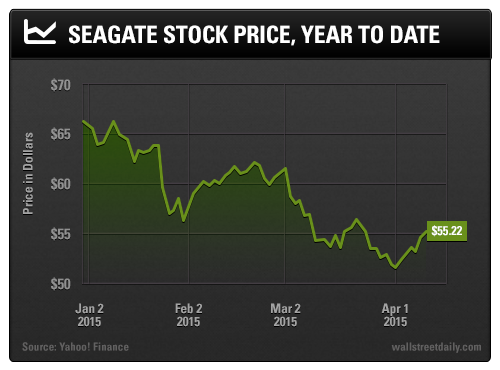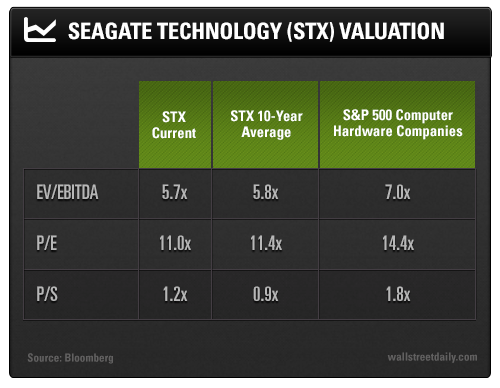Investing.com’s stocks of the week
The ongoing search for yield has had many powerful effects on the market… including driving the prices of large, stable companies skyward.
As a result, the high-yielding large cap is on the verge of extinction these days.
Still, I decided to dig through the ones that remain (there aren’t many), and I found one stalwart tech firm that boasts a double-digit total yield right now…
Price Gouged
After scouring a list of large-cap stocks with dividend yields of at least 3.75%, then comparing their valuation metrics, Seagate Technology (NASDAQ:STX), an American data storage company incorporated in Dublin, Ireland, stood out from the pack.
The firm, which was a critical player in the personal computer revolution, primarily manufactures hard disk drives (HDD) for computers and datacenters.
Today, though, Seagate’s main product has become ancient technology, at least in computer terms – and that has weighed heavily on its share price. Just take a look at STX’s price year to date:

That’s a precipitous decline.
Yet, the stock’s free fall has actually made it attractively valued. In fact, the stock has lots to offer investors at the moment…
Cheap, Stable Income
First, the valuation. It’s hard to ignore that STX is cheap, and that itself is unique in today’s market. As of this writing, the stock is trading below its 50-day moving average of $56 and even further below its 200-day moving average of $60.
For further proof, check out this chart comparing STX’s valuation to its own 10-year averages, as well as the rest of the computer hardware companies in the S&P 500:

As you can see, it’s pretty much right in line with its 10-year averages and is trading at a significant discount to comparable companies. Yet that’s hardly the only upside that STX has right now.
Indeed, STX stock boasts a fantastic yield. That starts with a 4% dividend yield, which is exceptional for a large-cap stock in this market.
Meanwhile, that dividend has been growing rapidly since it was reinstated in April of 2011. The most recent hike boosted the payout by over 25%, and the dividend has grown over 200% in the last four years.
Of course, a solid, growing dividend means nothing if the company can’t sustain that momentum.
Luckily, Seagate is a cash flow machine. It posted nearly $1.3 billion in free cash flow for the second quarter of 2015, and its dividend was covered more than four times over in the last 12 months. Going back further, the dividend has been covered at least three times over for five consecutive years.
On top of that, Seagate has been actively buying back shares for a number of years now, and that’s led to an outstanding total yield. In the last fiscal year, STX bought back 9% of its shares, giving the stock just over 13% total yield.
All told, Seagate has bought back over 30% of its outstanding shares since 2010 – and as long as the stock is trading below $60, management says it will continue repurchasing shares.
What Does the Future Hold?
I believe the 20% runoff in STX’s share price since January is excessive for a number of reasons.
First, Seagate has been working to retool its product line, and its business is no longer tied solely to HDDs. It now produces the more modern solid-state drives (SSD) that are also made by competitors such as SanDisk (NASDAQ:SNDK) and Micron Technology (NASDAQ:MU). Plus, Seagate has also adapted its enterprise storage business to include cloud-based solutions.
And in the short term, Seagate’s HDDs still offer numerous advantages over competing technology. First, they remain substantially cheaper than solid-state drives. As of February, PC Magazine estimated that HDDs cost roughly $0.07 per gigabyte, while the price of SSDs is double that, at $0.14 per gigabyte. And secondly, HDDs – with at least 10 terabytes of storage for personal computers – have much greater storage capacity than SSDs, which top out around four terabytes.
If that’s not enough, Seagate reported record storage shipments in its most recent quarter, up 17% year over year. And even though it saw revenue decline in the second quarter, management estimates that it would’ve posted a 5% revenue increase were it not for currency volatility around the world.
Finally, Seagate has one other fairly unique advantage: Because of its incorporation in Dublin, it pays an effective 0% tax rate. Several companies have attempted this tax inversion recently, but Seagate is one of just 20 in the S&P 500 that’s already enjoying this tax-friendly situation.
Bottom line: The recent drop in Seagate’s share price presents an opportunity for investors who could use a high-yielding, large-cap stock in their portfolios. Without a doubt, STX shareholders will be richly rewarded for holding the stock.
Good investing,
